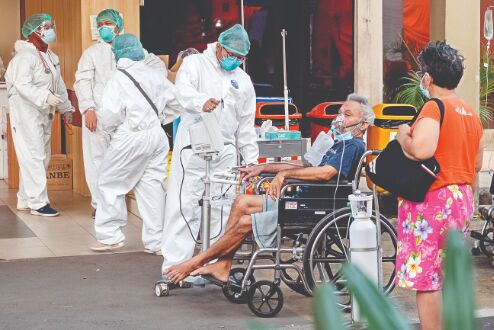Death rates soar in South-East Asia as virus wave spreads

Kuala Lumpur: Indonesia has converted nearly its entire oxygen production to medical use just to meet the demand from COVID-19 patients struggling to breathe. Overflowing hospitals in Malaysia had to resort to treating patients on the floor. And in Myanmar's largest city, graveyard workers have been laboring day and night to keep up with the grim demand for new cremations and burials.
Images of bodies burning in open-air pyres during the peak of the pandemic in India horrified the world in May, but in the last two weeks the three Southeast Asian nations have now all surpassed India's peak per capita death rate as a new Coronavirus wave, fueled by the virulent delta variant, tightens its grip on the region.
The deaths have followed record numbers of new cases being reported in countries across the region which have left health care systems struggling to cope and governments scrambling to implement new restrictions to try to slow the spread.
When Eric Lam tested positive for COVID-19 and was hospitalized on June 17 in the Malaysian state of Selangor, the center of the country's outbreak, the corridors of the government facility were already crowded with patients on beds with no room left in the wards.
The situation was still better than in some other hospitals in Selangor, Malaysia's richest and most populous state, where there were no free beds at all and patients were reportedly treated on floors or on stretchers. The government has since added more hospital beds and converted more wards for COVID-19 patients.
Lam, 38, recalled once during his three weeks in the hospital hearing a machine beeping continuously for two hours before a nurse came to turn it off; he later learned the patient had died.
A variety of factors have contributed to the recent surge in the region, including people growing weary of the pandemic and letting precautions slip, low vaccination rates and the emergence of the delta variant of the virus, which was first detected in India, said Abhishek Rimal, the Asia-Pacific emergency health coordinator for the Red Cross, who is based in Malaysia.
With the measures that countries are taking, if people follow the basics of washing the hands, wearing the masks, keeping distance and getting vaccinated, we will be seeing a decline in cases in the next couple of weeks from now, he said.
So far, however, Malaysia's national lockdown measures have not brought down the daily rate of infections. The country of some 32 million saw daily cases rise above 10,000 on July 13 for the first time and they have stayed there since.
The vaccination rate remains low but has been picking up, with nearly 15% of the population now fully inoculated and the government hoping to have a majority vaccinated by year's end. Doctors and nurses have been working tirelessly to try to keep up, and Lam was one of the fortunate ones.
After his condition initially deteriorated, he was put on a ventilator in an ICU unit filled to capacity and slowly recovered.



